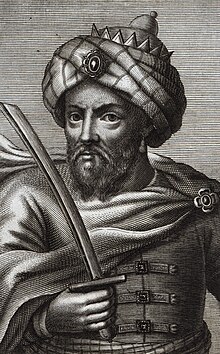 Global Information
Global InformationIsmail Ibn Sharif information
| Moulay Ismail Ibn Sharif مولاي إسماعيل بن الشريف | |||||||||
|---|---|---|---|---|---|---|---|---|---|
| Amir al-Mu'minin | |||||||||
 Illustration of Moulay Ismail by Germain Moüette, c. 1683[1] | |||||||||
| Sultan of Morocco | |||||||||
| Reign | 1672 – 1727 | ||||||||
| Coronation | 14 April 1672[2] | ||||||||
| Predecessor | Al-Rashid Ibn Sharif | ||||||||
| Successor | Abu'l Abbas Ahmad Ibn Ismail | ||||||||
| Governor of Fez | |||||||||
| Reign | 1667 – 1672 | ||||||||
| Born | c. 1645 Sijilmassa, Morocco | ||||||||
| Died | 22 March 1727 (aged 81–82) Meknes, Morocco | ||||||||
| Burial | March 1727 Mausoleum of Moulay Ismail, Meknes | ||||||||
| Spouse | among others: Lalla Aisha Mubarka Khanatha bint Bakkar Ma'azuza Malika Alwa Benabiz Aouda Doukalia Nassira el-Salwi bint Mohammed el-Heyba Halima Al Sufyaniyah Lalla Umm al-Iz at-Taba | ||||||||
| Issue | amongst 525 sons and 343 daughters: Moulay Mohammed Zeydan Lalla Sitt al-Mulk Moulay Abdalmalik Moulay Ahmed Moulay Abdallah | ||||||||
| |||||||||
| House | 'Alawi dynasty | ||||||||
| Father | Sharif ibn Ali | ||||||||
| Religion | Sunni Islam | ||||||||
Moulay Ismail Ibn Sharif (Arabic: مولاي إسماعيل بن الشريف), born around 1645 in Sijilmassa and died on 22 March 1727 at Meknes, was a Sultan of Morocco from 1672 to 1727, as the second ruler of the 'Alawi dynasty.[3] He was the seventh son of Moulay Sharif and was governor of the province of Fez and the north of Morocco from 1667 until the death of his half-brother, Sultan Moulay Rashid in 1672. He was proclaimed sultan at Fez, but spent several years in conflict with his nephew Moulay Ahmed ben Mehrez, who also claimed the throne, until the latter's death in 1687. Moulay Ismail's 55-year reign is the longest of any sultan of Morocco. During his lifetime, Isma’il amassed a harem of over 500 women with more than 800 confirmed biological children, making him one of the most prodigious fathers in recorded history.
The reign of Moulay Ismail marked a high watermark for Moroccan power. His military successes are explained by the creation of a strong army, originally relying on the 'Guichs' (especially the Udaya) and on the Black Guard (or Abid al-Bukhari), black slaves who were totally devoted to him. As a result, the central power could be less reliant on tribes that often rebelled. Moulay Ismail failed against the Regency of Algiers during the Battle of Moulouya in 1692, as he tried to expand his territory towards Tlemcen. Moulay Ismail once again attempted to capture Oran, which was under Spanish rule, he had some success in pushing back the tribes of the Regency of Algiers until the Algerian Bey Mustapha cooperated with the Spaniards in pushing back Moulay Ismail's army. Moulay Ismail engaged in the Maghrebi War against the Regency of Algiers, he was successful in conquering the Western Beylik, he even looted the palace of the Bey. His army was subsequently pushed back in the Battle of Chelif in 1701. He participated in other minor battles such as Laghouat in 1708 which ended successfully. He expelled the Europeans from the ports they had occupied: Larache, Asilah, Mehdya, and Tangier. He took thousands of Christians prisoner and nearly took Ceuta.
Ismail controlled a fleet of corsairs based at Salé-le-Vieux and Salé-le-Neuf (now Rabat), which supplied him with European Christian slaves and weapons through their raids in the Mediterranean and all the way to the Black Sea. He established significant diplomatic relations with foreign powers, especially the Kingdom of France, Great Britain, and Spain. Often compared to his contemporary, Louis XIV, due to his charisma and authority, Moulay Ismail was nicknamed the 'bloody king' by the Europeans due to his extreme cruelty and exaction of summary justice upon his Christian slaves. He is also known in his native country as the "Warrior King".
He also made Meknes his capital and undertook the construction of an enormous citadel and palace complex next to its old city which included several grand residences, gardens, monumental gates, mosques, and more than forty kilometers of walls. He died following a sickness. After his death, his supporters became so powerful that they controlled the country, enthroning and dethroning the sultans at will.
- ^ Henry de Castries (1903). Moulay Ismaïl et Jacques II: une apologie de l'Islam par un sultan du Maroc (in French).
- ^ "Morocco (Alaoui Dynasty)". www.usa-morocco.org. Archived from the original on 29 August 2005. Retrieved 10 April 2018.
- ^ Abun-Nasr, J.M., A History of the Maghrib in the Islamic Period, page 230. Cambridge University Press, 1987